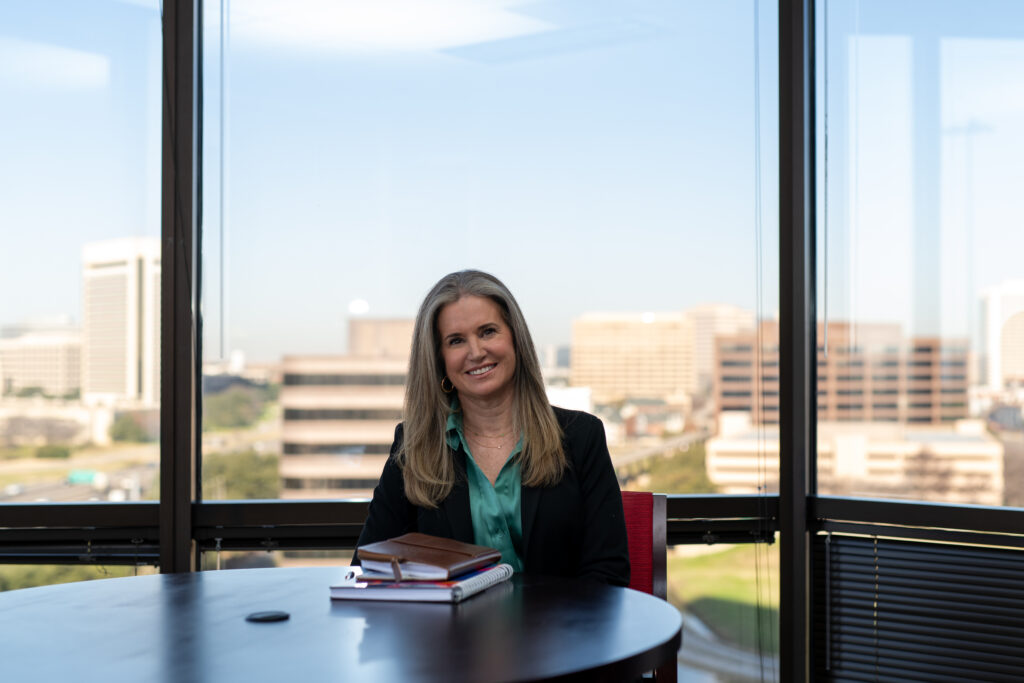
It’s indisputable: Rachel Morgan is a busy lady.
As general counsel of Nexstar Media Group, the largest television station owner in the U.S., she oversees Nexstar’s legal work and recently guided the company through one of its largest successes to date: acquiring its 75 percent majority stake in The CW network. She’s an active member of her church and the Dallas bar, a wife, a mother, a distance runner and a diehard Texas A&M fan.
Despite her already crammed schedule, Morgan dedicates a significant amount of her free time to pro bono and charitable efforts. She sits on the board of Nexstar’s foundation, which gives to dozens of nonprofits and public charities across the country. She’s on the host committee for United Way Tocqueville Society’s Bench & Bar and the board of the Dallas Bar Association’s Community Service Fund. Morgan and her husband recently funded a presidential endowed scholarship at A&M and have earmarked part of their estate to support their alma mater.
Most recently, Morgan co-chaired the DBA’s Equal Access to Justice Campaign, which raises funds for the Dallas Volunteer Attorney Program, the pro bono arm of the DBA that’s a joint venture with Legal Aid of NorthWest Texas. Last Saturday evening, before hundreds of members of the Dallas legal community, Morgan and fellow campaign leaders made a special announcement: They have raised a record $1.3 million to provide pro bono civil legal services to low-income residents of Dallas County. The new achievement follows Morgan’s storied history supporting DVAP, which has earned her multiple awards in recent years.
Through Morgan’s leadership, she attracted new donors to the EAJ campaign and influenced multiple firms, individuals and in-house legal departments to increase their contributions from previous years.
Citing her recent successes and longtime dedication to community service, The Texas Lawbook and the Association of Corporate Counsel’s Dallas-Fort Worth chapter have named Morgan the recipient of the 2023 DFW Corporate Counsel Award for Achievement in Pro Bono and Public Service. Morgan and the other 2023 recipients and nominees will be honored Thursday at a reception and awards ceremony at the George W. Bush Institute.
Premium Subscriber Q&A: The Lawbook talked with Morgan about attorney participation in pro bono, how she prefers outside firms staff her matters, what she looks for in outside counsel and the most important thing for doing pro bono well.
Thompson Coe partner Sarah Rogers, Morgan’s co-chair of the 2023-2024 EAJ campaign committee, said Morgan was critical to this year’s fundraising success.
“I have never had the privilege of working with someone more hardworking and more motivated than Rachel,” Rogers said. “She spent hours and hours of phone calls, emails and meetings dedicated to [this] cause. I respect her so much for doing that because it’s not something that everybody does.”
Lawyers who work with Morgan say one major reason she is so influential in getting the legal community to level up their time and money to pro bono legal services is that she continues to handle pro bono cases herself rather than merely asking for money. She has been handling pro bono cases with DVAP for the last 20 years.
“Talk about putting your money where your mouth is; she’s doing the work as the GC of a more-than-billion-dollar company,” said Dallas trial lawyer Chris Schwegmann, one of Morgan’s regular outside counsel. “It’s hard to argue with someone who actually has their hands dirty.”
Schwegmann, who is the managing partner of Lynn Pinker Hurst & Schwegmann, said his firm “more than tripled” its donation to the EAJ campaign during Morgan’s tenure as co-chair. He said Morgan also inspired him to make it a top firm priority of 2024 to increase Lynn Pinker’s pro bono presence.
“Rachel describes her career mission as lifting up the underserved in the community and the under-recognized in the legal profession through opportunities for work and connection,” said Sidley partner Aimee Fagan, who nominated Morgan for the award.
“She’s always working to level the playing field and give a voice to the people that don’t have a voice.”
‘She just outworked everybody’
A healthy dose of ambition and grit is required to become a lawyer, let alone a successful one, and a source of both of these qualities within Morgan came from her mother, Judy Andersen (now Judy Andersen Tines).
Morgan was 5 or 6 years old when her parents divorced, which followed “a terrible year and a half of [my father] having a very public affair,” Morgan said, and the split upended the life her mom came to know.
“She was depressed and … suicidal,” said Morgan, who grew up in Corpus Christi. “She had been a stay-at-home mom for seven years after starting her career as a teacher. My dad left us with nothing. This was 1977. The child support laws were just not very generous. He did not have to pay a lot.”
Despite graduating valedictorian in her high school class and in three years with honors at the University of Texas, the only decent-paying job Andersen Tines could get in Corpus Christi in the 1970s was as a secretary at a bank. But she worked her way up the ladder for 30 years, eventually becoming a senior vice president.
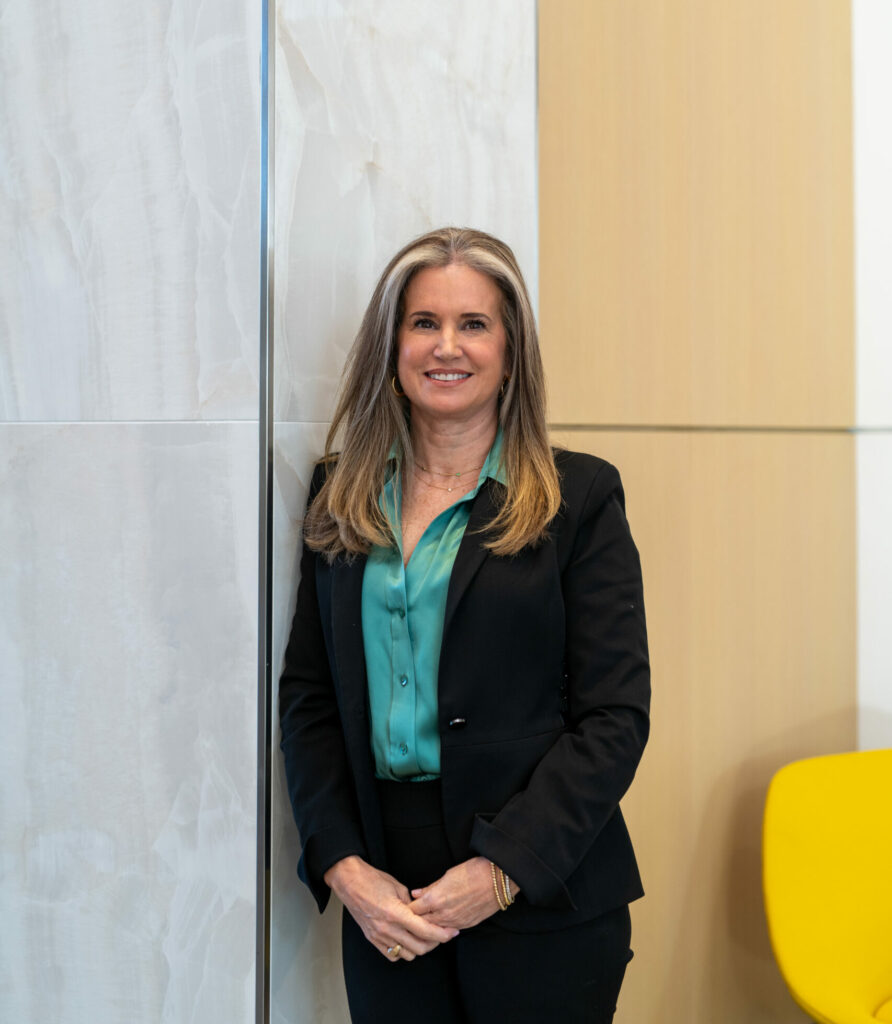
“She just outworked everybody,” Morgan said. I watched her [do it in] five-inch, sexy high heels, clip-clopping around the bank, and people were afraid of her. She is the sweetest human being you have ever met in your life, but she is intimidating, she’s smart, she’s direct. Even as a secretary, people just respected her.”
With the exception of Friday evenings (pizza night), Morgan’s mom “would come home and she would cobble dinner together exactly the same way that I cobbled dinner together for my kids when they were little,” Morgan said.
One of Morgan’s most vivid childhood memories is the ever-present sound of the washing machine running right outside her bedroom door.
“My mom would come home in her business suit and high heels, carrying dinner, doing laundry — just doing it all … while looking amazing, while dressing amazing, while being kind and caring about people.”
Seventeen years ago, Andersen Tines was forced to retire after she fell from a dam in the Guadalupe River, crushed her spinal cord and was paralyzed. Had it not been for a plaintiff’s lawyer and some nurses sitting by the river, she would have drowned. After six months of complete paralysis with no progress, the San Antonio hospital where she was receiving care said she was going to be discharged.
“And then the doctor saw her move her finger,” Morgan said of her mother. “Now she can walk. She lives a full life. She’s still a little disabled, but her recovery was even more impressive to me than her career. [My mom’s] favorite expression, which I carry with me all the time, is ‘This too shall pass.’ You can have the darkest moments. You can be struggling at work or in your performance or your personal life or your health. But a brighter day is coming.”
“I think about that all the time when I’m at a point of despair or driven to my knees,” Morgan added. I think, ‘Hang on, keep going.’ Because that’s what she does.”
‘You’ve got a smart mouth’
Morgan’s mother eventually remarried. With Morgan’s older sister and her stepdad’s two children, there were four kids in the house growing up. Including step and half-siblings from Morgan’s dad’s side, today she has a total of nine siblings.
“Growing up, it was a really chaotic life,” Morgan said. “It was full of some trauma and challenges, but also tons of love, and excitement and compromise — all the things you do when you have a great big, broken, crazy family.”
Morgan’s maternal grandfather was the city attorney for El Campo, Texas, though the family’s roots in the law did not influence her decision to become a lawyer since she never knew her grandfather. He passed in his 50s, before Morgan was born.
Morgan can’t point to any one catalyst that planted the idea of the law in her head, but she has theories.
“It was the dumb thing that people do with little kids who argue a lot,” she said. “The thing they say: ‘Oh, you’ve got a smart mouth, you’re going to be a lawyer.’ Somebody must have said that to me because I just got it in my mind. I loved arguing. I was very extraverted and very opinionated as a child. I loved public speaking … I was in the sixth grade oration competition. I was in theater and debate. I got voted most likely to succeed, and I was shamelessly ambitious. All the things that budding lawyers do, I did. I was sort of prototypical in terms of the path that I was on.”
Morgan was the last of the four children to attend college, so when the time came, “money was very tight.” Morgan wanted to go to UT like her mom had, but she chose Texas A&M University after the school offered her a scholarship.
“I went to orientation and cried because I thought they were a crazy cult,” Morgan said. “My mom said, ‘Just stick it out for a semester and see. You could always transfer.’”
Morgan attended Fish Camp — A&M’s freshman orientation — and had a change in perspective.
“I drank all the Kool-Aid — all of it,” she said. “I decided if I was going to go to college, I was going to go and cheer, do all of the things, and be a supporter of that college. And that’s what I did. I went all in.”
Morgan began dating her now-husband, Ross Morgan, on Valentine’s Day, which happened to be both of their 19th birthdays. The two had grown up together and, as little kids, had joint birthday parties.
“I married an Aggie and we became the crazy Aggie fans,” she said.
Today, the couple has two children — a daughter studying architecture at A&M and an aspiring Aggie son who is a junior in high school. And there will be more A&M students in their lives down the road. With the new Rachel and Ross Morgan President’s Endowed Scholarship, currently funded at $100,000, they will provide one student an annual stipend for their four years of college. A new scholarship recipient will be chosen every four years. As Texas A&M Foundation Heritage members, the Morgans will also gift part of their estate to A&M and will later earmark where specifically the money will go.
The family also has “a disaster of a dog” named Ricky Bobby, a half Boston Terrier and half English Bulldog who they adopted from a rescue that said he was an American Bully with chemical burns. (Turns out, according to Morgan’s veterinarian, that he just has bad skin, and, according to a DNA test, he is zero part American Bully.)
“Our kids are much better looking and much better behaved,” said Morgan, who described Ricky Bobby’s looks as an “English Bulldog that went through a cheese grater.”
‘It’s all about relationships’
To pay for the rest of her college education, Morgan took her junior year off to work as a co-op student so she could make money while getting college credit. She worked in Midlothian on the corporate side of Chaparral Steel for three semesters, selling steel to the eastern U.S., and earning $30,000 (“big money for me back then,” she says). Through the program, Morgan also won the cooperative education student of the year award, which included additional scholarship money.
Because Morgan operated on Eastern time at her job, she took her lunch break at 11 a.m., the same time as the forklift operators.
“I liked All My Children and they liked CHiPs, so we would alternate watching [both],” she said.
Morgan went on vacation for a few days, and when she returned “they had all watched All My Children when I was gone, and they told me what was happening with Tad and Dixie.”
“I learned from that experience that everybody is the same,” Morgan said. “If you’re working up the corporate ladder and you’re a lawyer, it’s just as important how you treat people in other departments who are in a different chain of command, who are subordinate to you or who are senior to you. It’s all about relationships.”
“Even if you’re a 20-year-old whisper of a person,” said Morgan, who said she weighed about 93 pounds at the time, “and working with a … 50-year-old blue-collar man, there’s always something that you can do together, that you can talk about, that you can share about, that you can help each other with.”
Upon college graduation, Morgan had been admitted into UT’s law school, but she deferred her admission to save up for tuition. She worked as a systems consultant for two years, traveling “all over,” working on big projects, and — like lawyers — billing by the hour, she said.
“It solidified my knowledge that I was going to become a lawyer because I was not meant to be a systems consultant,” she said. “It was programming and all this business stuff, so after two years, I decided, ‘Alright, that’s enough of that. I’m going to go be a lawyer.’”
Developing a love for pro bono
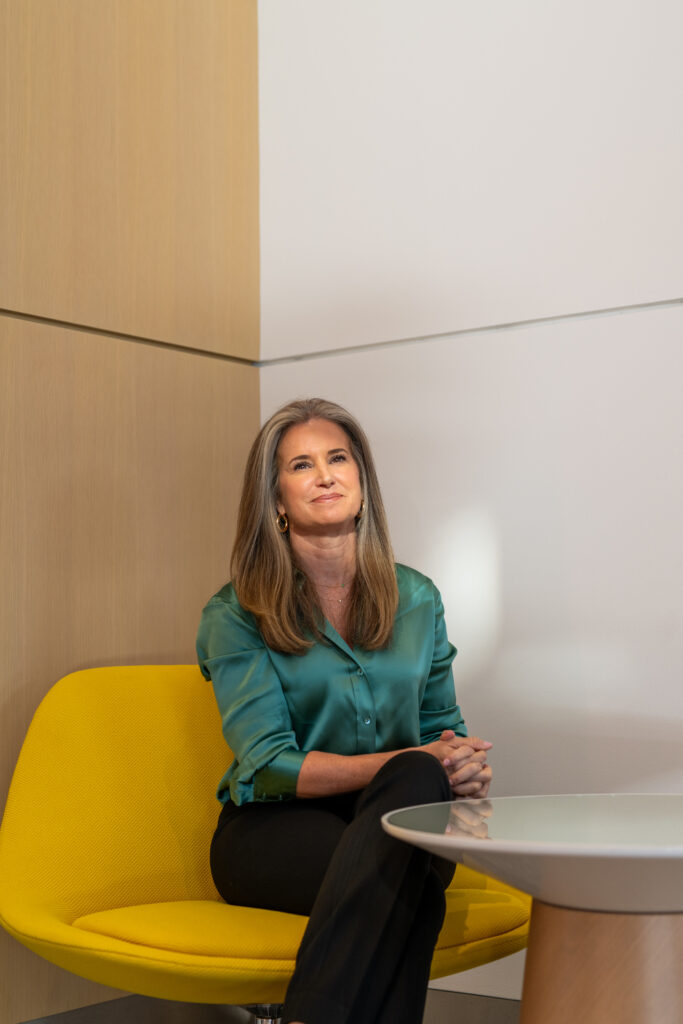
Morgan attributes her stepdad to establishing her heart of service.
“He was very committed to the underdog,” Morgan said. “He would just help everyone. He raised so much money for toys for tots at his church. He was busy. [My parents] were scraping to make ends meet to put four kids through college, and despite all of that he always found time to give to the church, to give to charities, to do all the things.”
A love of public service and pro bono deepened for Morgan in law school when she participated in a juvenile law clinic and traveled around the state for her paper on juvenile holdover facilities. She observed “shocking” disparities among different facilities.
“Some of them are lovely places and they care for the children and other places felt very much like adult prisons, putting juveniles in solitary confinement until the time of their hearing,” she said.
After law school, Morgan moved to Houston and started her legal career at Fulbright & Jaworski in the litigation department with an emphasis on labor and employment. On the pro bono side, Morgan got her feet wet by providing some assistance to a partner, John Raley, on a death penalty case. On the billable side, Morgan was quickly recognized as one of the “best associates we’ve [ever] had,” Norton Rose Fulbright U.S. Chair Shauna Johnson Clark said.
“From day one she was one of the hardest working associates we had ever seen,” Clark said. “You know certain people who are very ambitious and work very hard, but everybody knows it because they are just difficult to work with. Rachel has always been very ambitious and very hardworking, but at the same time, collegiate and happy and easy to get along with. She was the real deal early on. She needed very little handholding or close supervision.”
Clark, who recruited Morgan while she was at UT Law, said the two became good friends from working very closely together. An early matter Clark vividly remembers Morgan excelling at came when she argued a motion to disqualify opposing counsel. The lawyer had worked at Fulbright but left to become a plaintiff’s lawyer. He attempted to sue one of the firm’s clients.
“Rachel was maybe a second-year associate at the time,” Clark said, “and she was given and eagerly accepted the opportunity. She crossed him very efficiently, and the motion was granted. That lawyer was disqualified from representing any clients against our client.”
From H-Town to D-Town
To Morgan’s dismay, she left Houston in 2001 after her husband, who had been hired by an investment bank, was transferred to the Dallas office. Houston had quickly felt like home and she had trouble leaving.
“I thought I was going to live in Houston forever,” she said. “It was like Corpus Christi on steroids. It was on the water, it was super laid back, there was really good food, we met all our friends and it was an hour and a half from College Station.”
“He dragged me kicking and screaming and I hated Dallas for 10 years,” Morgan said. “I thought it was the most plastic, wannabe L.A. [city] … people making $30,000 a year driving $40,000 cars. And then we had kids, we made friends, and I ended up at AT&T, and I started to love it. Now it’s my life’s mission to be an ambassador for Dallas. When people move here, I have a big list of all the restaurants and pediatricians and hairstylists and fun things to do … because I don’t want anybody to ever suffer through 10 years of not loving the place that you live.”
Morgan spent several years in Norton Rose Fulbright’s Dallas office, then another four-and-a-half years at Morgan Lewis before going in-house in 2012.
“I had just turned 40 and had spent 200 nights in hotel rooms in 2011-2012,” she said. “My kids were 4 and 7. I did not want to keep up that lifestyle. I had friends at AT&T and one of them reached out about an open position. It was the best of both worlds — big legal department with talented lawyers, so it felt like Big Law in some respects, but no billable hours and very limited travel.”
During her nine years at AT&T, Morgan’s job title changed nine times. She held roles in legal operations and the corporate secretary’s office, as well as privacy, compliance and global marketing; retail and sales operations; and multiple other business units.
Morgan had finally obtained her dream job at AT&T leading labor & employment and corporate litigation when Nexstar Media Group came calling. She joined as general counsel in June 2022.
“[AT&T] rotated me through almost every job in the legal department, so I became somewhat uniquely qualified to be the general counsel of a publicly traded company,” Morgan said. “I had always aspired to be a public GC, so when Nexstar reached out, I was interested. The more I learned about the company and the people, the more I was convinced that it was meant to be.”
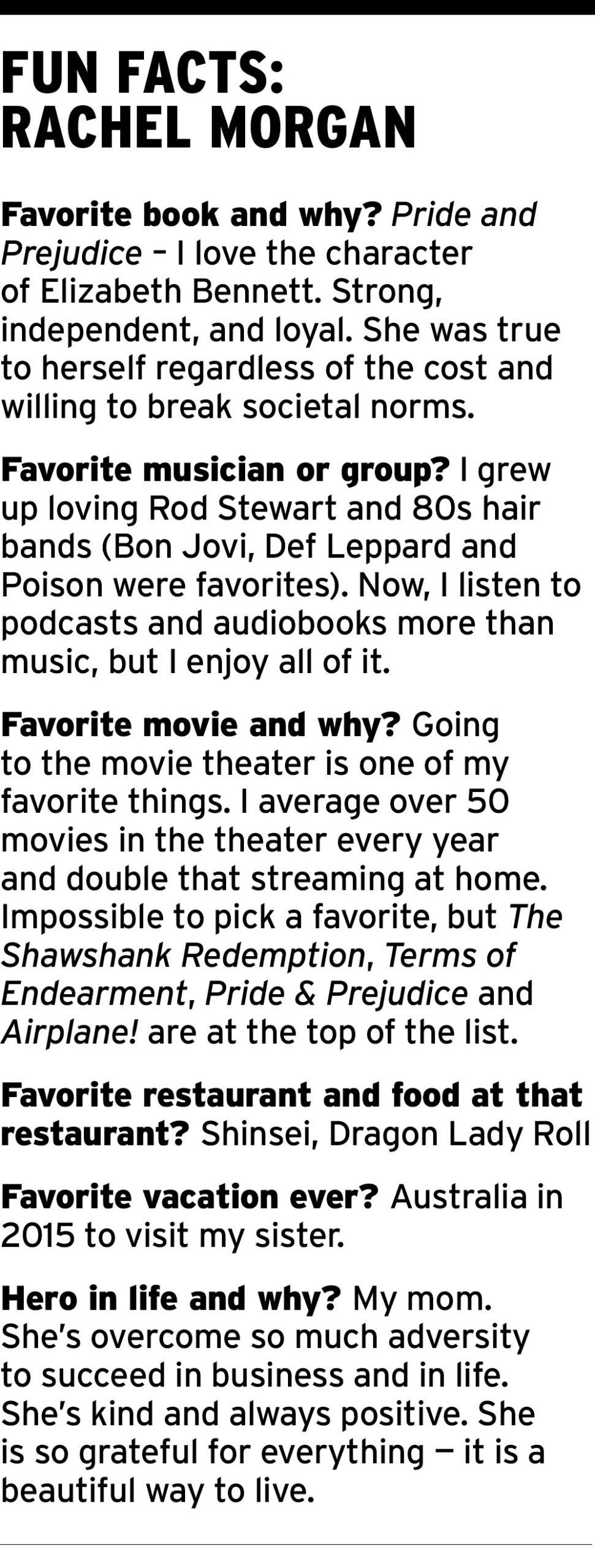
Irving-based Nexstar is the largest television station owner in the United States. With more than 12,000 employees, Nexstar owns, operates, programs or provides sales and other services to 200 broadcast stations (including partner stations) and reaches 116 markets — more than 68 percent of all U.S. television households. Its portfolio includes major network affiliates such as ABC, CBS, NBC, Fox and — as of October 2022 — the CW, which Nexstar acquired a 75 percent majority stake in.
At Nexstar, Morgan oversees all the company’s legal affairs — business transactions, regulatory filings, privacy and data security, labor and employment, intellectual property, real estate and litigation — and also oversees the human resources department. In addition, she serves on the Nexstar Media Charitable Foundation Board.
Established in 1958, Nexstar’s foundation donates roughly $350,000 annually to a variety of organizations throughout the U.S. Anchors of local news stations affiliated with Nexstar often present the checks to the nonprofits. Texas nonprofits that Nexstar made grants to in recent years include Boys & Girls Club of Wichita Falls, High Point Village in Lubbock, the El Paso Community Foundation and the Dallas Education Foundation.
Over MLK weekend, Nexstar aired a half-hour program across all of its owned or partner television stations featuring Dr. Martin Luther King Jr.’s only grandchild, Yolanda Renee King, who published a picture book in honor of her grandparents earlier this month. Nexstar’s foundation also donated $10,000 to the Drum Major Institute, which Arndrea Waters King, Yolanda’s mother and MLK’s daughter leads as president. The Drum Major Institute is a nonprofit founded in 1961 aimed at carrying out Dr. King’s vision of a world free of racism, poverty and violence into the 21st century.
Morgan said the foundation receives as many as five grant requests a week, so it is the board’s job to aggregate requests from various TV stations and Nexstar business units, go through a vetting process and decide who to give funding to each year.
For the past two years, the Nexstar foundation has given a total of $30,000 to the Dallas Bar’s Equal Access to Justice Campaign.
Diving head-first into DVAP
Morgan had just started her job at Nexstar when Cheryl Camin Murray, last year’s DBA president, asked her to get involved with the EAJ Campaign — first as vice-chair, then as co-chair. But Morgan’s history with DVAP, the campaign’s beneficiary, goes back 20 years.
Morgan has been handling DVAP pro bono cases for nearly as long as she’s lived in Dallas. She started out handling simple divorce cases — no kids, no assets, no contest, both parties in Texas — and as her comfort level grew, she took on more complicated divorces.
One of her most rewarding cases involved representing a woman who divorced her schoolteacher husband who had gotten a 13-year-old student pregnant while he was going through the criminal process and continuing to live with her.
“She wanted to go into law enforcement or become a lawyer herself, so it was extremely gratifying to help get her out of that situation,” Morgan said.
Another divorce case she thinks of fondly involved a husband Morgan had met at one of the clinics.
“He was the sweetest man and I just believed every word he said; I thought he was the straightest arrow,” Morgan said. “I thought, ‘Oh my gosh, I’ve got to help this guy. Nobody is going to help this guy as much as I will.’”
Then the case took a twist.
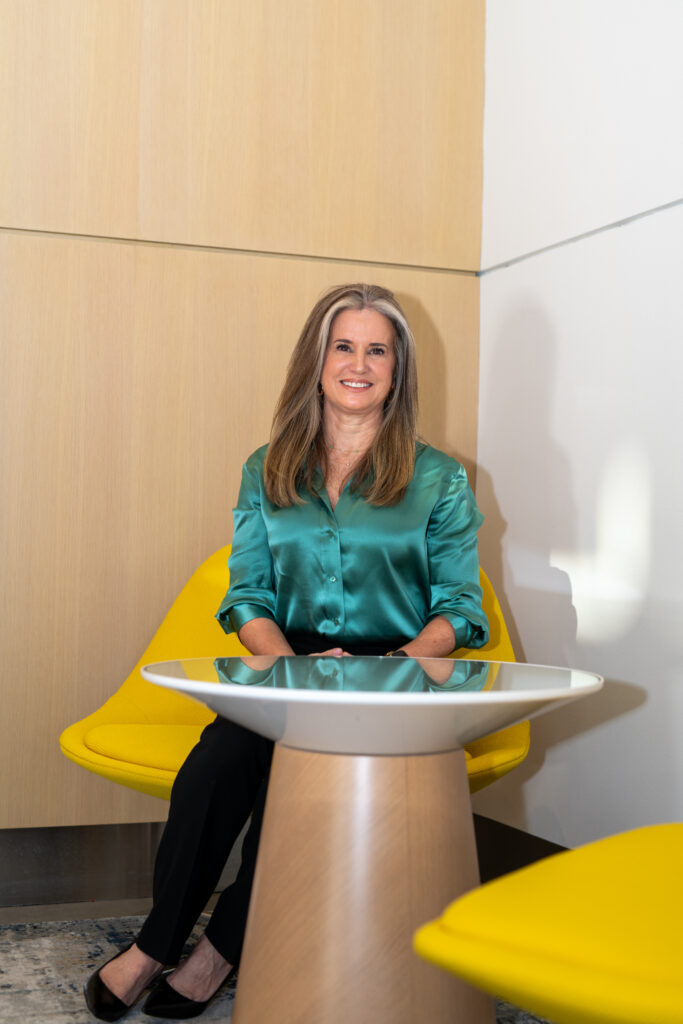
“He got arrested for a smash-and-grab of an ATM and didn’t pass his drug test for cocaine,” Morgan said. “It was sort of like your child — you just think that they’re infallible and that they never do anything wrong, and when they do it just breaks your heart, and you want to help them because you know they have such goodness in them and then they make these bad decisions. Ultimately, we got the divorce and everything was fine.”
Morgan said pro bono work is important to her because even a simple matter for the lawyer often means everything to the client.
“People are very intimidated by the law. They have no appreciation or understanding for the things that the lawyers think are easy breezy,” she said. “If you can just provide them with a quick read of their rental agreement or point them in the right direction for a name change … it’s a real big deal for some folks. It is very complicated for people because they don’t even know where to start. They’re tied up in all sorts of emotional connection.”
As Morgan advanced in her career, so too did her role with DVAP, starting with devoting more time toward managing and organizing pro bono clinics. At AT&T, she was the lead liaison for the company’s involvement with DVAP clinics, staffing, coordinating and organizing the company’s in-person clinics, and won multiple awards internally for pro bono and public service. When DVAP clinics moved online in 2020 in light of the pandemic, she continued her involvement, helping AT&T become one of the first DVAP partners to get involved with virtual clinics. For her efforts, DVAP recognized Morgan in 2021 with the Outstanding Pro Bono Coordinator of the Year Award. She also served one year as fundraising committee chair for DVAP’s Women’s Advocacy Awards.
During the 2022-2023 fundraising year when Morgan served as vice chair of the EAJ committee, the campaign raised more than $1.2 million for DVAP — a record amount. Morgan helped EAJ break that record again this year as co-chair raising a record $1.3 million. The campaign committee set an overall goal of $1.4 million that it hopes to reach by Jan. 31.
“I put my time, my treasure, my talent and my money where my mouth is when it comes to DVAP because I think they are doing really significant work,” she said. “I think it is our professional responsibility and privilege to care for folks in our community who can’t afford legal services.”
Asked what the biggest pro bono challenges in Texas are, Morgan said that because the State Bar of Texas does not make attorney pro bono participation mandatory, it can be a challenge for busy attorneys to be motivated to volunteer their time to provide free legal services.
“Some firms are better at incentivizing and rewarding pro bono work than others, but for most folks, pro bono work is a low priority,” she said.
“It should be the highest priority work that we do.”
